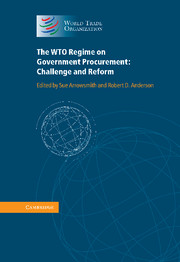Book contents
- Frontmatter
- Contents
- List of contributors
- Foreword by Pascal Lamy
- Perspective of the Chairman of the WTO Committee on Government Procurement, Nicholas Niggli (Switzerland)
- Preface
- Disclaimer
- PART I The WTO regime on government procurement
- PART II Expanding the scope of the Agreement on Government Procurement: accession and coverage
- PART III Revision of the procedural rules and other transparency provisions of the Agreement on Government Procurement
- PART IV Developing countries in the WTO procurement regime
- PART V Economic and social development (horizontal policies) in government procurement
- PART VI Enforcement and remedies
- PART VII Multilateralism and regionalism
- PART VIII Challenges and new directions
- Index
Foreword by Pascal Lamy
Published online by Cambridge University Press: 07 September 2011
- Frontmatter
- Contents
- List of contributors
- Foreword by Pascal Lamy
- Perspective of the Chairman of the WTO Committee on Government Procurement, Nicholas Niggli (Switzerland)
- Preface
- Disclaimer
- PART I The WTO regime on government procurement
- PART II Expanding the scope of the Agreement on Government Procurement: accession and coverage
- PART III Revision of the procedural rules and other transparency provisions of the Agreement on Government Procurement
- PART IV Developing countries in the WTO procurement regime
- PART V Economic and social development (horizontal policies) in government procurement
- PART VI Enforcement and remedies
- PART VII Multilateralism and regionalism
- PART VIII Challenges and new directions
- Index
Summary
Government procurement is gaining ground as part of world trade, and as part of the work of the World Trade Organization (WTO). During, and in the aftermath of, the world economic crisis, much attention has focused on public infrastructure investment and on government policies that potentially limit the rights of foreign suppliers to bid on related contracts. Such policies were a key focus of my 2009 end-of-year Overview of Developments in the International Trading Environment. In that overview, I noted that ‘buy national’ and other restrictive government procurement measures
raise concerns for trade and the international trading system in three main ways. First, they can exclude foreign suppliers from markets in which they could otherwise hope to compete, either by reserving the market completely for domestic suppliers or by introducing administrative complexities that make procurement procedures less easily accessible for foreign suppliers. Second, paradoxically, in some cases they may even raise the costs or impede the operations of domestic companies in the countries implementing the relevant measures, if such companies experience difficulties in sourcing domestically and cannot easily obtain waivers for purchases abroad. Third, as in other economic sectors, the implementation of discriminatory government procurement measures in one country may engender pressures for the adoption of similar measures by other countries.
- Type
- Chapter
- Information
- The WTO Regime on Government ProcurementChallenge and Reform, pp. xxv - xxviiiPublisher: Cambridge University PressPrint publication year: 2011
- 1
- Cited by



